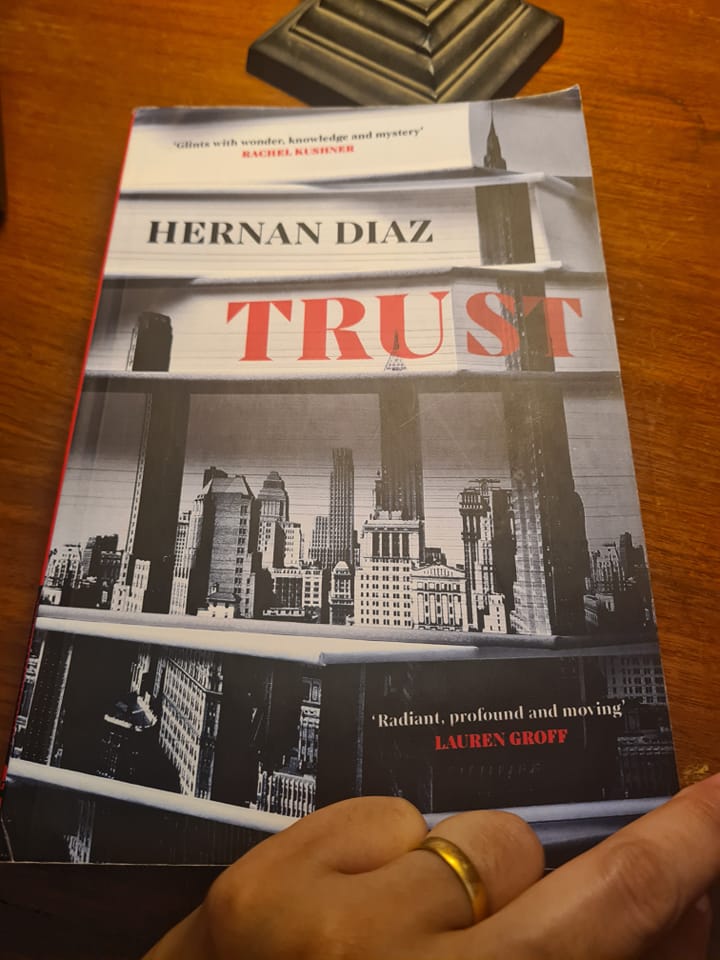Hernan Diaz “Trust”

[I wrote this post on Facebook on 4 July 2022]
Hernan Diaz’s novel Trust is being discussed a lot these days especially since Kate Winslet has optioned it for HBO as a limited series on TV. Both, author and actress, will be co-producers of the show. It should be good if past experience of Kate Winslet’s award-winning “Mare of Easttown” is anything to go by. “Trust” too is equally complex in its narratives. The adaptation will be gruelling as it will require a single narrative with disruptions in the telling to create the same effect that reading the book has.
The book is in four parts. A bestselling novella called “Bonds” by Harold Vanner. It is the fictionalised account of legendary 1920s Wall Street tycoon and his wife, Benjamin and Helen Rask. She is the daughter of eccentric aristorcrats who are down and out on their luck. Marrying Rask, Helen zooms to the top of the New York social ladder, much to the delight of her ambitious mother. The story continues about the obscenely wealthy and childless couple becoming patrons of the Arts but remaining more or less to themselves. The love story ends with the declining health and demise of Helen Rask in a sanatorium in Switzerland. “Bonds” is followed by personal accounts of the real tycoon, Andrew Bevel (“My Life”), his secretary Ida Partenza (“A Memoir, Remembered”) and extracts from Mildred Bevel’s diaries ( “Futures”).
It is an astonishing feat on the part of Hernan Diaz in writing in these four distinctive voices. Beginning with the novella where the literary craftsmanship is sublime. The elegant prose is like a nineteenth century novel in a twenty-first century garb. Unlike novels of today which presume a reader will have access to extra information or can “google” for more, “Bonds” is complete. It is the delightfully balanced mix of historical fiction, facts, authorial intervention, and moral judgement. In their desire to be poltically correct in their sentences and subject matters, writers of today forget that sitting upon judgement whether their characters or by extension society, is not always a bad thing. It is a way of seeing. “Bonds” has it all. In the next three parts, Diaz does an incredible unpicking of the “truths” that the novelist chose to share. Curiously enough the reader is first made privy to the novella and in the last of the woman, Mildred Bevel, who is at the centre of these multiple stories. Reading her diaries is a shatteringly pathetic experience. She is a woman who lacked no want and yet no amount of money could buy her the peace, health, goodwill, or long life. It was a frictionless existence that in some ways did her in. She had nothing to do. Self-flagellation as claimed by Harold Vanner was one outlet but her diaries claim otherwise. As does the witnessing by her husband Andrew Bevel. Ida Partenza is a compelling narrator but thoroughly unreliable as she was ostensibly Andrew Bevel’s ghostwriter and was not given access to any of the people or documents at the time of writing. Interestingly enough she was sufficiently obsessed with Mildred Bevel that late in life she read Mildred Bevel’s papers and diaries at the library where the material lay. It had been untouched for decades. Thereby exposing her fragility and vulnerability while blasely dismissing the woman’s narrative and only accepting that version of her story which came through male filters. But the arrangement of texts within “Trust” leaves the reader questioning authoritative accounts and relying on empirical evidence. Sadly, it is all constructed. Whom does the reader trust?
Diaz has to be complemented for the very modern sensibility in his writing of switching gears between various gendered perspectives and telling a story. When he does the voice of women his brilliance shines. I hope to goodness he is not shut down for cultural appropriation of women’s voices — he is excellent. He also gets across the desire of Andrew Bevel to be a controlling man, with his masculine narratives very well.
Trust is superb. Read it. For the story. For the ingenious storytelling. For the sophisticated writing. You will not regret it. I hope it finds a mention on the Booker Prize longlist that is to be announced in late July 2022.
Update: This book did make it to the Booker longlist, but it never made it to the shortlist. Nevertheless, its word-of-mouth success and the number of other literary awards it has reaped, including the Kirkus Award and a Barack Obama recommendation, has ensured that this book has remained in the buzz. It is superb!
Pan Macmillan did well in publishing it.
24 Jan 2023

